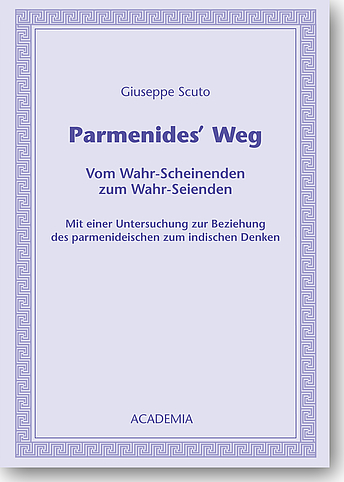Scuto
Parmenides' Weg
ISBN 978-3-89665-365-9
englischParmenides is not a philosopher in the present-day sense of the word. He is so little a philosopher, that, in order to found classical philosophy, Plato has to commit parricide. Indeed Parmenides is rather the thinker of an epoch-making transition, the cultural link between pre-philosophical (maybe even Eastern) wisdom on the one hand and post-Socratic, Western philosophy on the other. The aim of this study is to reconstruct as completely as possible the thought of Parmenides in order to highlight both the internal unity and the originality of his doctrine.
Indeed, the innovative theorisation of Being by the Eleatic author in part one of his poem is matched in part two by physics based on the same principle: a real 'pars construens' which has exercised a significant influence on the immediately following philosophers of 'physis'. One and the same vision, i. e. the logical-ontological impossibility and the gnoseological unthinkability of the existence of any kind of Non-Being, is in fact the foundation of a dualistic conception of the world. Behind the truthlike appearance of Doxa (which has, nevertheless, its own way of existing in time and space), there is the true Being existing beyond time. This was a momentuous doctrine which ever since has never ceased contributing to the main trends of Western metaphysical tradition.
In an Appendix the author examines the likelihood of contacts between early Indian thought (as represented by the Rig-Veda and the first Upanishads) and the doctrine of Parmenides.
Parmenides ist kein Philosoph im üblichen Sinne des Wortes. Er ist sogar so wenig ein Philosoph, dass Platon gezwungen ist, einen Vatermord zu verüben, um die klassische Philosophie überhaupt gründen zu können. Parmenides ist vielmehr der Denker eines epochalen Übergangs, die Nahtstelle zwischen vorphilosophischer Weisheit östlicher Prägung einerseits und postsokratischer, abendländischer Philosophie andererseits.
Diese Studie hat sich vorgenommen, eine möglichst ausführliche, vollständige Rekonstruktion der parmenideischen Lehre durchzuführen, die die Einheitlichkeit und die Neuheit des Werkes des Eleaten hervorhebt.
Denn der bahnbrechenden Theoretisierung des Seins entspricht eine auf demselben Grundprinzip basierende Physik, die eine regelrechte pars construens im Gedicht bildet und die einen erheblichen Einfluss auf die unmittelbar nachfolgende Philosophie der Physis ausgeübt hat. Eine und dieselbe Einsicht, die logisch-ontologische Unmöglicheit und die gnoseologische Undenkbarkeit jeder Art Existenz eines Nicht-Seienden, liegt nämlich einer dualistischen Vision der Welt zugrunde: über die nur wahr-scheinende (und trotzdem in der Zeit und im Raum auf ihre Weise existierende) Doxa hinaus erschließt sich das wirkliche, jenseits jeder Zeit wahr-seiende Sein. Eine folgenschwere Auffassung, die seit jeher zu den wichtigsten Strömungen der westlichen metaphysischen Tradition beigetragen hat.
Im Anhang untersucht der Autor die Möglichkeit etwaiger Kontakte zwischen dem früheren indischen Denken (wie es im Rg-Veda und in den ersten Upanishaden zu finden ist) und der Lehre des Parmenides.


